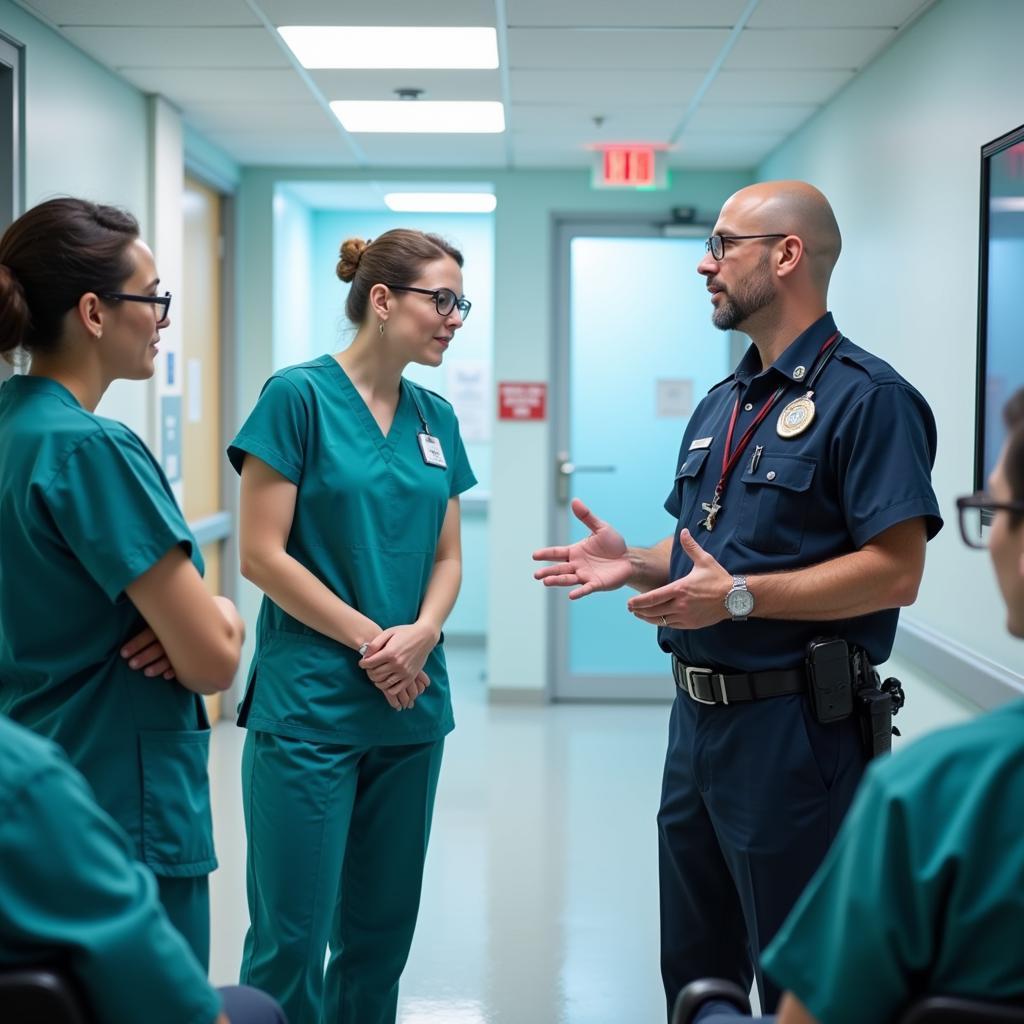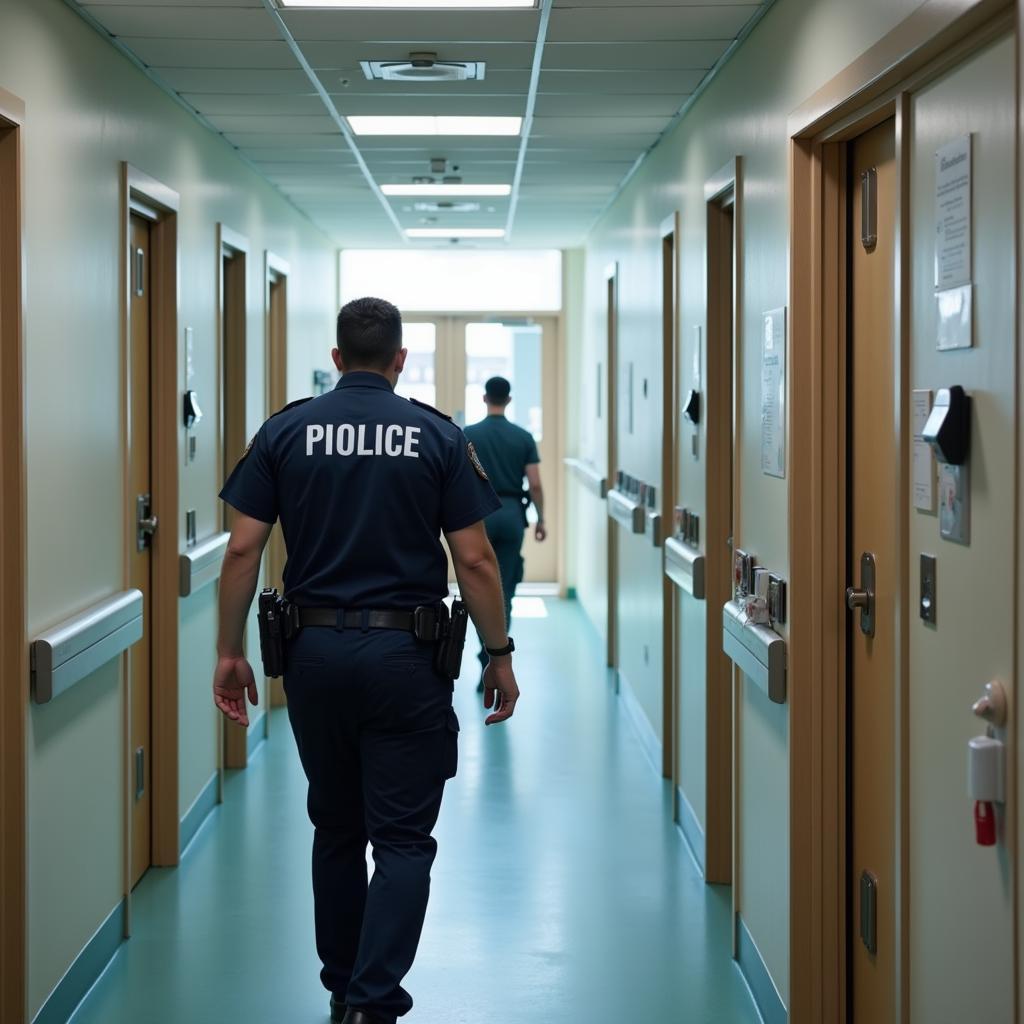Hospital Safety Officers are essential for maintaining a secure and protected environment for patients, staff, and visitors. They are the guardians of healthcare facilities, ensuring a safe and efficient operation that allows medical professionals to focus on patient care. Their responsibilities span a wide range, from preventing accidents and managing emergencies to enforcing security protocols and ensuring compliance with regulations.
Understanding the Responsibilities of a Hospital Safety Officer
A hospital safety officer’s job is multifaceted. They develop and implement safety policies, conduct regular safety inspections, and provide training to staff on safety procedures. They investigate accidents and incidents, identify hazards, and recommend corrective actions. They also manage security systems, respond to emergencies, and liaise with law enforcement. These dedicated professionals are the backbone of a secure hospital environment. They’re responsible for creating a culture of safety within the facility.
 Hospital Safety Officer Training Staff on Emergency Procedures
Hospital Safety Officer Training Staff on Emergency Procedures
Why Hospital Safety Officers are Indispensable
In today’s complex healthcare landscape, hospital security officers are more important than ever. They play a crucial role in mitigating risks, protecting assets, and ensuring the smooth running of the hospital. Their presence deters criminal activity, provides a sense of security, and allows medical personnel to focus on their primary duty – patient care. A safe hospital is a more effective hospital.
“A well-trained hospital safety officer is the first line of defense against a multitude of threats,” says Dr. Anna Hernandez, a leading expert in hospital administration. “Their vigilance and expertise are invaluable in ensuring the safety and well-being of everyone within the hospital walls.”
Key Skills and Qualities of an Effective Hospital Safety Officer
Effective hospital safety officers possess a unique combination of skills and qualities. They have strong observational skills, are able to think quickly and decisively in emergencies, and possess excellent communication and interpersonal skills. They are also knowledgeable about relevant laws and regulations, including those related to occupational safety and health, fire safety, and security. Furthermore, they exhibit a high level of professionalism, integrity, and dedication to their work.
How Hospital Safety Officers Contribute to Patient Care
While not directly involved in patient care, hospital safety officers contribute significantly to a positive patient experience. By maintaining a safe and secure environment, they reduce stress and anxiety for patients, allowing them to focus on their recovery. This contributes to improved patient satisfaction and overall outcomes.
 Hospital Safety Officer Responding to an Emergency Situation
Hospital Safety Officer Responding to an Emergency Situation
“Patients feel more at ease knowing that their safety is a top priority,” adds John Miller, a seasoned security consultant. “The presence of visible security personnel creates a sense of reassurance and allows patients to focus on their healing process.”
The Future of Hospital Safety
The role of the hospital safety officer is constantly evolving. With advancements in technology and the increasing complexity of healthcare, these professionals will need to adapt and acquire new skills. This includes staying updated on the latest security technologies, understanding cybersecurity threats, and managing emerging risks. The future demands hospital safety officers who are proactive, innovative, and adaptable.
Choosing the Right Hospital Safety Officer
Selecting the right hospital safety officer is a critical decision for any healthcare facility. Look for individuals with a strong background in security or law enforcement, relevant certifications, and a proven track record of success. Consider their experience in healthcare settings, their ability to work effectively in a team environment, and their commitment to patient safety.
The role of a hospital safety officer is vital to the overall functioning of a healthcare facility. They are the unsung heroes who work diligently behind the scenes to ensure that everyone within the hospital walls is safe and secure. Their dedication and expertise are essential for creating a healing environment where patients can recover and medical professionals can provide the best possible care.
Conclusion
Hospital safety officers play a critical role in ensuring the safety and security of everyone within a healthcare facility. They are the guardians of a safe and secure environment, allowing patients to heal and medical professionals to focus on their work. Their dedication and expertise are crucial for the smooth and efficient operation of any hospital. Magnet hospitals in new jersey prioritize safety, and a skilled hospital safety officer is a key component of that commitment.
FAQ
- What are the main responsibilities of a hospital safety officer?
- What qualifications are required to become a hospital safety officer?
- How do hospital safety officers contribute to patient care?
- What are the key skills of an effective hospital safety officer?
- What is the future of hospital safety?
- How can I find more information about hospital safety?
- What are the common challenges faced by hospital safety officers?
For further information regarding hospital safety and security, you can explore our articles on code 250 hospital and hospital angeles tijuana bc. You might also be interested in reading about how many private hospitals in nyc.
When you need assistance, please contact us at Phone Number: 02437655121, Email: [email protected] or visit us at: 298 Cau Dien Street, Minh Khai, Bac Tu Liem, Hanoi, Vietnam. We have a 24/7 customer service team.